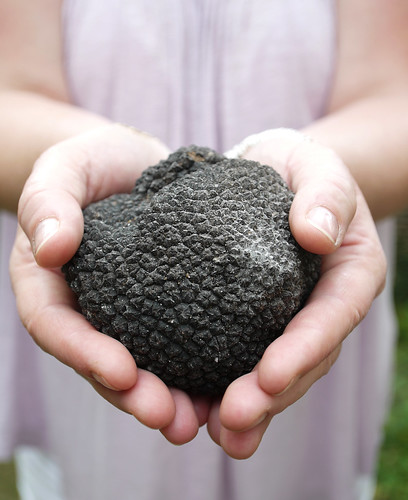
My last experiment with vetiver was actually a solid perfume. I was so smitten with my Vetiver Rouge, that I wanted to turn it into a crème parfum. But I also really loved the coffee & vetiver accord, so I decided to use some coffee oil in the formula. In that sense, there is nothing new in this particular vetiver, except for merging Vetiver Rouge with Vetiver Noir. Bear with me for a few more lines and you’ll see what’s new in this particular vetiver rendition.
I usually use a base of jojoba oil and raw beeswax (the unbleached one, which still retains the lovely honey and pollen notes, and adds a new dimension to the final product). This time, I decided to do something a bit different: This time, for my vetiver solid perfume, I decided to use a completely different base oil: Black Truffle Oil!

Black Truffle Oil is an infusion of the rare fungi into olive oil. So you see, the base oil is actually an olive oil. The result is a slightly different texture – a bit lighter, and more like an unguent. The black truffle note is very tenacious – earthy, dirty and sensual. Along with the subtle honey notes, the tarragon, coffee and 5 types of artisanal vetiver oils (including the Ruhs from India) this is definitely a different vetiver from what I’ve smelled before. I may even be tempted to turn it into a parfum oil, with a base oil made of a combination of Black Truffle Oil and jojoba oil.
Thinking about it - that would be much easier to pack as a sample and share with you as well. The reason why I didn't think of it before completely escapes me...
This vetiver entry closes this cycle of vetiver posts. I love vetiver, so I won’t be surprised to come back to it later. But for now, I need my vetiver ideas to be brewing on low heat, until the right ideas will bubble up to the surface…
* The silver box above, containing the vetiver solid perfume is an ethnic Moroccan piece given to me by my X in-laws when they came back from Morocco years ago. Isn't it lovely?
** If you wish to try Vetiver Truffle, or any of the previous four vetivers (Wilde Vetyver, Vetiver Blanc, Vetiver Noir and Vetiver Rouge) samples can be obtained via email. The price is the same for all my other samples ($5.99 plus shipping). If you order all four, you will also get a free sample of the solid vetiver perfume (to be announced here tomorrow).





